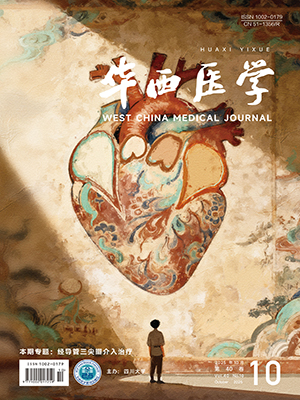| 1. |
Ferrari J, Knoflach M, Kiechl S, et a1. Early clinical worsening in patients with TIA or minor stroke: the Austrian Stroke Unit Registry. Neurology, 2010, 74(2): 136-141.
|
| 2. |
占达良, 王晟, 张耿. 影响急性脑梗死患者预后的入院前相关因素分析. 中国卫生统计, 2018, 35(4): 569-571.
|
| 3. |
Zhu Z, Yang J, Zhong C, et al. Abnormal glucose regulation, hypoglycemic treatment during hospitalization and prognosis of acute ischemic stroke. J Neurol Sci, 2017, 379: 177-182.
|
| 4. |
刘猛, 练学淦, 吴坚, 等. 高龄后循环脑梗死患者预后的相关影响因素分析. 临床神经病学杂志, 2016, 29(3): 172-174.
|
| 5. |
Xu T, Zhang JT, Yang M, et al. Dyslipidemia and outcome in patients with acute ischemic stroke. Biomed Environ Sci, 2014, 27(2): 106-110.
|
| 6. |
刘仲仲, 段康丽, 蔺雪梅, 等. 西安地区急性脑梗死患者 1 年预后不良的相关危险因素分析. 中华老年心脑血管病杂志, 2018, 20(11): 1169-1173.
|
| 7. |
Seners P, Baron JC. Revisiting ‘progressive stroke’: incidence, predictors, pathophysiology, and management of unexplained early neurological deterioration following acute ischemic stroke. J Neurol, 2018, 265(1): 216-225.
|
| 8. |
王惠, 马先军. 脑梗死急性期血压变化特点及其与进展性脑梗死的关系. 卒中与神经疾病, 2015(4): 226-229.
|
| 9. |
Kwon HM, Lee YS, Bae HJ, et al. Homocysteine as a predictor of early neurological deterioration in acute ischemic stroke. Stroke, 2014, 45(3): 871-873.
|
| 10. |
吴逊. 全国第四届脑血管病学术会议纪要. 卒中与神经疾病, 1997(2): 51-55.
|
| 11. |
Chen PH, Gao S, Wang YJ, et al. Classifying ischemic stroke, from TOAST to CISS. CNS Neurosci Ther, 2012, 18(6): 452-456.
|
| 12. |
Martin AJ, Price CI. A systematic review and meta-analysis of molecular biomarkers associated with early neurological deterioration following acute stroke. Cerebrovasc Dis, 2018, 46(5/6): 230-241.
|
| 13. |
Leira R, Dávalos A, Silva Y, et al. Early neurologic deterioration in intracerebral hemorrhage: predictors and associated factors. Neurology, 2004, 63(3): 461-467.
|
| 14. |
Shi Z, Guan Y, Huo YR, et al. Elevated total homocysteine levels in acute ischemic stroke are associated with long-term mortality. Stroke, 2015, 46(9): 2419-2425.
|
| 15. |
潘杨, 张丽. 脂蛋白相关磷脂酶 A2 与轻型缺血性卒中早期神经功能恶化风险分层的相关性研究. 南京医科大学学报(自然科学版), 2016, 36(8): 991-994.
|
| 16. |
王惠, 马先军, 董万利, 等. 脂蛋白相关磷脂酶 A2 对大动脉粥样硬化型脑梗死病情进展的预测价值. 脑与神经疾病杂志, 2017, 25(7): 407-410.
|
| 17. |
王惠, 马先军. 脂蛋白相关磷脂酶 A2 在缺血性脑卒中中的临床应用. 卒中与神经疾病, 2018, 25(6): 729-732.
|
| 18. |
Wang Y, Zhang J, Qian Y, at al. Association of Lp-PLA2 mass and aysmptomatic intracranial and extracranial arterial stenosis in hypertension patients. PLoS One, 2015, 10(6): e0130473.
|
| 19. |
王惠, 董万利, 马先军, 等. 影响进展性卒中的相关因素分析. 中华脑血管病杂志(电子版), 2014, 8(1): 51-54.
|
| 20. |
Shen B, Yang X, Sui RB, et al. The prognostic value of the THRIVE score, the iScore score and the ASTRAL score in Chinese patients with acute ischemic stroke. J Stroke Cerebrovasc Dis, 2018, 27(10): 2877-2886.
|
| 21. |
胡挺, 张俊, 王凯, 等. 急性缺血性卒中患者静脉溶栓后早期神经功能恶化: 预测因素和对短期转归的影响. 国际脑血管病杂志, 2019, 27(8): 580-585.
|
| 22. |
丁琪, 陈旭. 急性缺血性脑卒中预后影响因素研究. 中华老年心脑血管病杂志, 2016, 18(11): 1182-1185.
|




